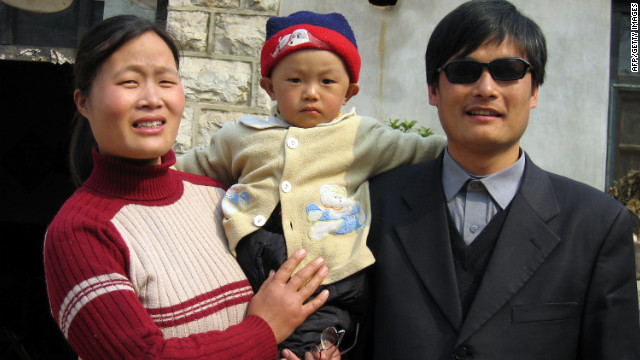
- Chen Guangcheng and his family are en route to Newark
- Chen will be able to pursue his studies when he reaches the U.S.
- Chen's escape from house arrest and refuge in the U.S. Embassy caused diplomatic tensions
- China allowed the blind human rights activist to apply to study abroad
Beijing (CNN) -- Prominent human rights activist Chen Guangcheng had neither passport nor visa in hand when he was shuttled to the airport Saturday in Beijing. Hours later he was on United Flight 88, scheduled to arrive in the United States in the evening.
His last moments in his native China were as frenzied as the political firestorm over his status after he escaped house arrest a month ago.
Chen's 'concrete' steps to leaving China
Chen had been in a hospital for the past few weeks, awaiting documents to travel after New York University offered him a fellowship. He was given passport applications for himself and his family on Wednesday.
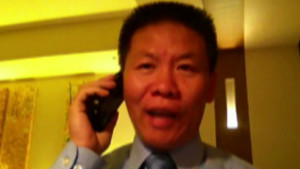
 Activist Chen Guangchen flies to NY
Activist Chen Guangchen flies to NY At 10 a.m. Saturday, he received a call from authorities ordering him to pack his bags, said Bob Fu, president of ChinaAid, a Texas-based Christian human rights organization that has been campaigning for Chen's freedom.
At 11, he was on his way to the airport. He still had no documentation.
At the airport, Chen waited with his wife and two children in a secure location. He was in a wheelchair, dark glasses over his eyes -- Chen is blind. He told Fu that he did not know his final destination.
The Newark-bound flight was scheduled to depart at 3:45 p.m. but was delayed by two hours.
Fu spoke with Chen 15 minutes before he boarded.
"We're ready to go," he told Fu.
As the wheels lifted off Chinese soil, so, too, did the anxiety that has enveloped Chen and his family over a past of mistreatment and a future of uncertainty.
Chinese activists family suffers reprisals, he tells U.S. lawmakers
The self-taught legal activist angered Chinese officials with his fight against alleged forced abortions under China's one child policy.
Chen spent four years in prison, and was then held under constant lock down in his village.
New York University law professor Jerome Cohen, who first met Chen when the activist traveled to the United States as part of a State Department program in 2004, said he was "very happy" to hear the news of Chen's pending arrival in America.
"I look forward to welcoming him and his family tonight, and to working with him on his course of study," he said.
Chen's departure from China was an answered prayer, Fu said, adding that Chen was deeply grateful to the international community's efforts to secure his freedom -- efforts that tested the United States' relations with the Communist giant.
Chen spent six days in the U.S. Embassy after he escaped house arrest, which sparked a diplomatic tussle ahead of a visit to Beijing by U.S. Secretary of State Hillary Clinton.
Hillary Clinton talks China, Chen in wide-ranging interview
State Department spokeswoman Victoria Nuland confirmed that Chen, his wife and two children were en route to the United States.
"We are looking forward to his arrival in the United States later today," she said.
"We also express our appreciation for the manner in which we were able to resolve this matter and to support Mr. Chen's desire to study in the U.S. and pursue his goals."
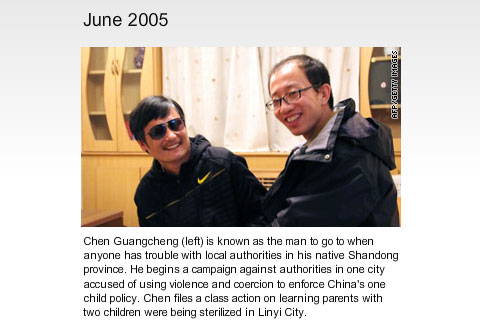
 Chen Timeline
Chen Timeline 
 Chinese activist at Beijing airport
Chinese activist at Beijing airport 
 Clinton: China will let Chen come to U.S.
Clinton: China will let Chen come to U.S. 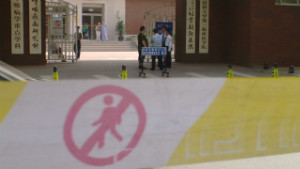
 China cracks down on Chen's supporters
China cracks down on Chen's supporters 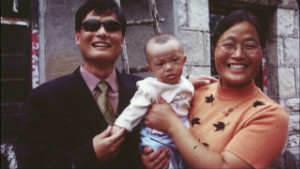
 Part 1: Advising Chen Guangcheng
Part 1: Advising Chen Guangcheng On arrival, Chen is due to begin a new chapter in his life as a student at New York University. China had said that Chen could apply to study abroad.
But the one thing he could not leave behind was fear of reprisals for the rest of his extended family at the hands of the authorities in Shandong Province in eastern China.
"My elder brother was taken away by these thugs without any reasoning and then they came back and started beating up my nephew, and they used stakes and violently beat him up," Chen told the House Foreign Affairs Committee in a telephone call from his hospital room earlier this week.
Chen added that his relatives' homes had been broken into and they had been beaten by people working for the government.
Chen said his nephew Chen Kegui tried to defend himself and now faces a "totally trumped-up" charge of attempted homicide.
"After my nephew was beaten up, he actually was waiting to surrender himself and the police come back again and violently beat up my sister-in-law," Chen said.
The authorities in Linyi, the city that oversees Chen's village, had issued a statement accusing Chen Kegui of injuring government officials with a knife and saying he would be dealt with according to the law. They have declined toon the matter since.
ChinaAid urged the international community to continue to monitor the situation for Chen's extended family in China, amid concerns over possible reprisals by the authorities.
Amnesty International echoed that concern.
"Chen's journey to the United States would not have been possible without his own valiant character, the courageous support of his family and friends and the robust voice of the international community that never stopped working on his behalf," said Frank Jannuzi, head of Amnesty International's Washington office.
"But while Chen and his immediate family are safe, Amnesty International continues to be concerned about those in China who share his quest for justice, for they remain in serious jeopardy," he said. "Countless people, known and unknown, are subject to arbitrary detention, beatings and other forms of repression.
For Chen, whose escape from authorities in Shandong played out like a Hollywood thriller -- a persecuted blind man who climbed over a high wall and hid in a pig sty -- Saturday's sudden journey over an ocean and a continent was perhaps a fitting chapter in his story.
Sunday morning, Chen will begin a new life in America, calm and resolute as always.
"You got the feeling you were in the presence of some Chinese equivalent of Gandhi or something," Cohen said. "He had this gentle but steely moral force."
Chen never sought out to be a rabble-rouser, Cohen said, though he will always be thought of as one.
CNN's Steven Jiang contributed to this report.
No comments:
Post a Comment